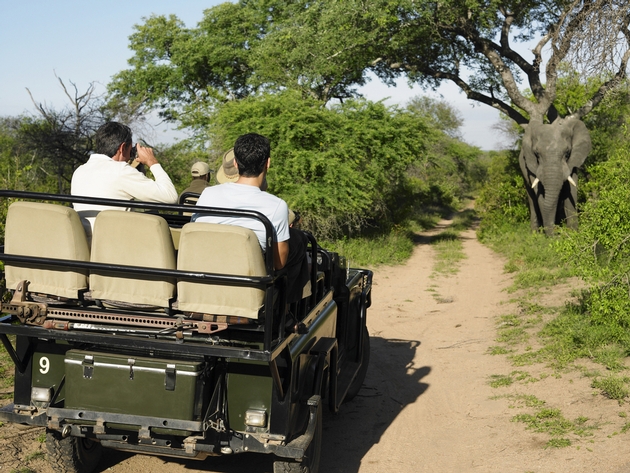A packed room for a challenging session on the need to develop better wildlife tourism. “We are breeding less elephants a year than are being killed,” said Africa’s Finest’s Colin Bell.
“Yet the tourism industry has numbed us to what is going on out there.” He added that much of the funding for terrorism in Africa – from Al-Shabaab to the Lords Resistance Army – comes from poaching, and the scale of poaching has become so bad that unless it is addressed, Africa could lose much of the very wildlife that tourists come to see within 20 years.
Colin said that the tourism industry should channel funds towards wildlife protection across Africa – he proposes a 1% tariff – asking the audience: “Are we going to be the saviour, or are we going to be the destroyer?”
Geoff Manchester from Intrepid Travel focussed on the issue of riding captive elephants. “The reality behind elephant riding is that an elephant’s spirit has to be crushed,” he explained, and that since discovering this brutal reality his company had recently stopped offering any elephant rides on its trips.
He said that since making the change, the topic has been the most discussed on their social media channels, and had positive impacts on the company’s brand, and cited example of Elephant Nature Park in Thailand as a better experience for tourist that is also better for elephants.
Earlier in the day, ABTA’s chief executive Mark Tanzer introduced a session on Reducing Energy and Water Consumption with the words: “Climate Change is potentially catastrophic for tourism as we are a thirsty, energy dependent industry.”
Looking for how to respond to these risks, Rebecca Hawkins from Responsible Hospitality Partnership said: “We mustn’t put to much faith in technology.
Energy saving devices deliver savings, but they are not the answer, because the reality is that total emissions from the sector have gone up despite the fact that businesses keep adding technological solutions.”
She added that: “We need to move the language we use to talk about sustainability away from focussing on the duty towards the opportunities. Responsibility for sustainability messaging should not be responsibility of the sustainability team. It should be part of a company’s core message.”
Fran Hughes from the International Tourism Partnership said that while energy was a much talked about issue, water was much less so.
She said that research by her organization earlier this year found that for most hotels, water is considered a less important risk than health and safety and labour rights. Yet, she explained: “Demand for water will outstrip supply in 1/3 world in 16 years.” She said that investors increasingly look at water risk, whether from flooding or drought and that companies therefore need “quit seeing water risk as a sustainability issue, and see it as a core business risk”.
In the same session, Rachel McCaffery from Intasave reflected on the most recent IPCC report into climate change, saying “not enough people in tourism see relevance of IPCC report to our industry”. Yet from her work in the Caribbean with Intasave, she explained: “Coral reefs absorb up to 90 per cent of wave energy, but rising sea temperatures and levels have destroyed corals and are wiping out beaches in places like Jamaica, Mexico and Barbados, putting livelihoods at risk.”
In the panel on Inclusivity and Tourism, José Fernandes Franco from Campo do Sonhos inspired the audience by showing how at his resort in Brazil it is possible for dsiabled people to do all manner of experiences, including canopy walks for the blind, ziplines for paraplegics, and white water rafting for quadriplegics.
And that this made good business sense as his occupancy rate was 87% for 7 days a week, year round. Enable Holidays’ Lynne Kirby said that while there has been a lot of progress in recent years: “Most hotels still only have 2-3 rooms adapted for disabled people.”
Paralympian Ade Adepitan observed from his travels that: “If they can stick a lift in a 2000 year old building like the Colosseum in Rome, how is it people are complaining about retrofitting a building built 20 years ago.”
– ENDS –
About World Travel Market
World Travel Market, the leading global event for the travel industry, is the must-attend four-day business-to-business exhibition for the worldwide travel and tourism industry.
More than 50,000 senior travel industry professionals, government ministers and international press, embark on ExCeL – London every November to network, negotiate and discover the latest industry opinion and trends at WTM.
WTM, now in its 35th year, is the event where the travel industry conducts and concludes its deals.
WTM 2013 generated more than £2 billion of travel industry contracts, revealed independent research by Fusion Communications.
WTM is owned by the world’s leading events organiser Reed Exhibitions (RE), which organises a other portfolio’s of travel industry events including IBTM Events, the world’s leading showcases for the meetings and events industry and International Luxury Travel Market events.
In 2013, RE held more than 500 events in 40 countries bringing together more than six million people from around the world generating billions of dollars in business.
Reed Exhibitions
Reed Travel Exhibitions (RTE) is the world’s leading provider of exhibitions in the travel and tourism industry, with a wide-ranging portfolio of 21 international events in 14 countries throughout the Americas, Europe, the Middle East, Asia Pacific and Africa.
Its market-leading, business-to-business events cover all elements of travel and tourism, including leisure travel, luxury travel, meetings, events, incentives and business travel, as well as golf, ski and spa travel.
RTE is part of Reed Exhibitions.
www.reedtravelexhibitions.com
